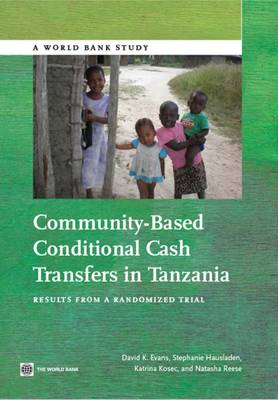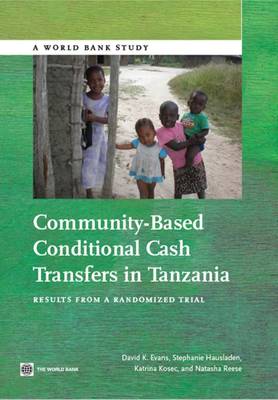
- Afhalen na 1 uur in een winkel met voorraad
- Gratis thuislevering in België vanaf € 30
- Ruim aanbod met 7 miljoen producten
- Afhalen na 1 uur in een winkel met voorraad
- Gratis thuislevering in België vanaf € 30
- Ruim aanbod met 7 miljoen producten
Zoeken
Community-Based Conditional Cash Transfers in Tanzania
Results from a Randomized Trial
David Evans, Stephanie Hausladen, Katrina Kosec, Natasha Reese
€ 27,45
+ 54 punten
Omschrijving
Given the success of conditional cash transfer (CCT) programs elsewhere, in 2010 the Government of Tanzania rolled out a pilot CCT program in three districts. Its aim was to see if, using a model relying on communities to target beneficiaries and deliver payments, the program could improve outcomes for the poor the way centrally-run CCT programs have in other contexts. The program provided cash payments to poor households, but conditioned payments on complying with certain health and education requirements. Given scarce resources, the Government randomly selected 40 out of 80 eligible villages to receive the pilot program. Households in participating and comparison villages were broadly comparable at baseline. This report describes the program and the results of a rigorous, mixed methods impact evaluation. Two and a half years into the program, participating households were healthier and more educated. Health improvements due to the CCT program were greatest for the poorest half of households--the poorest of the poor. They experienced a half a day per month reduction in sick days on average, and poor children age 0-4 in particular had a full day per month reduction in sick days. In education, the program showed clear positive impacts on whether children had ever attended school and on whether they completed Standard 7. Households were also more likely to buy shoes for children, which can promote both health and school attendance. In response to the program, households also made investments to reduce risk: Participating households were much more likely to finance medical care with insurance and much more likely to purchase health insurance than were their comparison counterparts. The program did not significantly affect savings on aeverage, although it did increase non-bank savings amongst the poorest half of households. Participating households also invested in more livestock assets, which they used to create small enterprises. The program did not, however, have significant impacts on food consumption. On the whole, the results suggest that households focused on reducing risk and on improving their livelihoods rather than principally on increasing consumption. There is also evidence that the project had positive effects on community cohesion.
Specificaties
Betrokkenen
- Auteur(s):
- Uitgeverij:
Inhoud
- Aantal bladzijden:
- 188
- Taal:
- Engels
- Reeks:
Eigenschappen
- Productcode (EAN):
- 9781464801419
- Verschijningsdatum:
- 18/03/2014
- Uitvoering:
- Paperback
- Formaat:
- Trade paperback (VS)
- Afmetingen:
- 178 mm x 254 mm
- Gewicht:
- 340 g

Alleen bij Standaard Boekhandel
+ 54 punten op je klantenkaart van Standaard Boekhandel
Beoordelingen
We publiceren alleen reviews die voldoen aan de voorwaarden voor reviews. Bekijk onze voorwaarden voor reviews.








